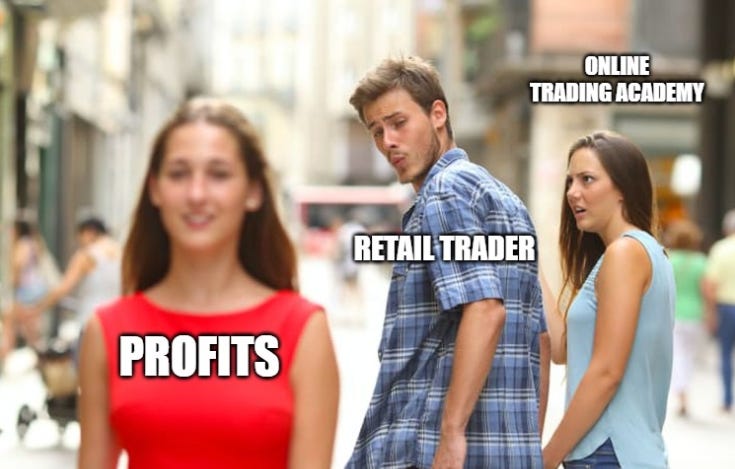Cancel Culture
Hi Folks 👋
Happy Sunday! I’m back from NYC but I wish I was still there. Don’t get me wrong — I love Vancouver but it’s hard to beat the zest and liveliness of the greatest city of the world, especially right now with Covid restrictions still muting activity in much of Canada. I went from closing down bars packed with people (I mean going to lots of cafes, my mom reads this too) to returning to my condo where you are required to mask up in the lobby even if you’re fully vaxxed and will probably run into nobody. Canada is already distant (per person) by default as our population is a tenth of the US and with these social distancing restrictions still in place, the isolation effect is definitely more pronounced here. And the fact that you can’t jaywalk! Like c’mon! But at least I didn’t have to quarantine for two weeks this time. I’m definitely happy about that.
What I am not so happy about is the cancel culture taking over SPACs. We had two SPAC mergers terminated this past week — $PSTH merger with UMG (Bill Ackman’s SPAC) and $XPOA merger with Jam City. For the former, as many of you may recall, Ackman raised the largest SPAC ever at $4B last year. It was probably to flex his great money raising skills but that flex caused a real sore muscle as Ackman struggled to find a good deal, mostly because of the big trust size. Normally, SPACs merge with a private company for a 10-20% minority stake, hence the average SPAC size of ~$300M. However with a $4B SPAC, Ackman was looking at targets with valuations of $20B+ (or as he called them “mature unicorns”). That automatically reduced the number of viable targets and the few that were available, probably found out about his “activist” middle name during their due diligence process and ran for the hills.
Long story short (you can read the kinda long version here), time was ticking and he couldn’t find a deal. But Ackman lives by the adage of “when the going gets tough, the tough get going”, so he carved this tough (read: very tough and abstruse) deal to acquire a 10% stake in Universal Music Group (UMG), but not as a SPAC merger, more like a fund buying stock in a company. He also wouldn’t use the entire proceeds of $PSTH towards the UMG transaction, and put $1.5B in $PSTH Remainco where he would look for another deal. And then there was a third thing about issuing SPARs in a SPARC to the $PSTH shareholders to participate in future Ackman deals.
It was very convoluted to understand back then, but I thought it was just me being dumb. But turns out the SEC couldn’t really make sense of it either, and said that “they did not believe that $PSTH would be able to consummate the transaction” and were particularly concerned that the deal structure wouldn’t qualify for the NYSE rules. The Rule being 102.06 of the NYSE Listed Company Manual, which states that a SPAC merger has to have “a fair market value equal to at least 80% of the net assets held in trust,” and $PSTH was only planning to spend about 74% of its money on the UMG shares, keeping the other 26% for its next deal ($PSTH Remainco). Anyways, Ackman will still buy that UMG stake but through his hedge fund so that Vivendi (parent company of UMG) isn’t left “at the altar” and $PSTH is back on the market looking for a mature unicorn.
The break up between $XPOA and Jam city was much more amicable as they seem like a modern evolved couple, who came out and announced their mutual decision to part ways and jam on. Maybe they went to therapy before. I actually liked the transaction, and I guess we will perhaps see Jam City do a traditional IPO soon?
One question that I am genuinely curious about is the amount of legal costs that these negotiations must incur. And it’s coming out of the SPAC trust. Like does $PSTH even have money left in their SPAC trust to go search for a deal? Or maybe that’s Ackman’s strategy now…to bring the SPAC size down to more average levels and search for a target with reasonable valuation.
The third almost canceled deal this week was the $CCIV merger with Lucid Motors. The stock was trading at $22, which is $12 above its trust value! Which also indicates that the shareholders really like this deal. And yet, they couldn’t get the shareholders to come out and vote. $CCIV had to send out multiple reminders to the retail shareholders and almost educate them about their voting obligations. The merger was finally approved, but if a popular deal like Lucid struggled to seek approval, the less popular deals will have a much harder time. Matt Levine explained what led to this problem and why it could become a bigger problem for SPAC related mergers in the future. An excerpt below -
Lots of SPAC investors — particularly in hot electric-vehicle SPAC deals like Churchill/Lucid — are retail shareholders who have never bothered to vote their shares, either because they are inexperienced and new to investing or just because there is almost no context where a retail shareholder’s vote could possibly matter.
Relatedly, if you bought your shares on Robinhood, Robinhood is not exactly laser-focused on getting you to vote. They don’t know yet that they should remind you to vote! They probably should.
The stock trades like 10 million shares a day. (There are 207 million shares outstanding.) The record date for the vote was June 21. If you owned stock on June 21, you get to vote. If you bought stock after June 21, you don’t. If you owned stock on June 21 and then sold it, you still get to vote. But you are unlikely to care very much. “Stockholders as of the close of business on June 21, 2021, the record date for the Special Meeting, should vote their shares even if they no longer own them,” said Churchill in its press release yesterday, but why should they? It doesn’t affect them anymore. They sold their stock; if the merger fails, they keep their money, and can have a good laugh at the people who bought the stock from them.
I think the next step in the democratization of retail trading is educating them about the rules of the game. Hopefully they learn!
One deal that thankfully didn’t get canceled this week was the merger between $GHVI and Matterport. As a Matter-o-fact, I like Matter-o-port (New ticker is $MTTR). Founded in 2011, it’s a spatial data company that uses artificial intelligence to turn any physical space into a 3D immersive experience, and monetizes primarily via a SaaS business model. The company has a first mover advantage in creating those “Digital Twins” and has built over 10 billion sq. ft. of library with customers in 150+ countries. Covid was definitely a tailwind as physical visitation to properties almost came to a halt, and that led to a remarkable 525% growth in their customers from 40,000 in 2019 to over 250,000 in 2020. Matterport did $86M in revenues for 2020 and anticipates a revenue CAGR of 59% and a gross margin improvement of 2500 bps between 2019-2025. Their net retention jumped to 129% in Q1 2021, indicating great customer loyalty.
While Real Estate is the most obvious ‘customer’ so to speak, because of the 3D tours etc, there are many other verticals that may be a little less obvious but are already being Matterported. For example, Travel - The ability to peruse an accommodation as if in real time before making a decision. Or Insurance - The ability to provide a ‘3D Walkthrough’ where the company can gather easy-to-use, accurate data in a time efficient manner expediting claim processing and approvals. Or Facilities - The ability to capture digital twins and create efficient solutions. With over 4 billion buildings in the world, the TAM of this space is huge at $250B, and the Matterporting has just begun.
The $GHVI Matterport deal was announced at 11.2x 2022E revenues. And at the current price of ~$14.4, it implies an EV of ~$3.1B (and an EV/Revenue multiple of 15.7x for 2022 Revenues of $202M). One of the cons against the overall thesis has been the rich valuation. However, I don’t think it is a compelling enough reason as I truly feel that this is one of those 10x in 10 years deals, and the stock will grow into its valuation. Also, the first mover advantage, the large TAM, sticky customer base have all helped the company build a solid MOAT that will not be easily eroded. The company has already partnered with Facebook to turn on “Phase 2” of its business, which is figuring out what to do with the treasure trove of data that it has collected from digitizing the built world. Here is a great recent interview with RJ Pittman, CEO of Matterport (starts at 22:20 mark). Matterport will report their Q2 results on August 11.
And that’s all folks. I hope your week ahead is filled with curiosities like the curious cat tote that I picked up from one of my most favourite places in the world, aka the Strand bookstore. I also picked up Sylvia Plath’s Bell Jar, John McPhee’s Draft No. 4 and Marcel Proust’s Swann’s Way.
Until next week,
Nikita








